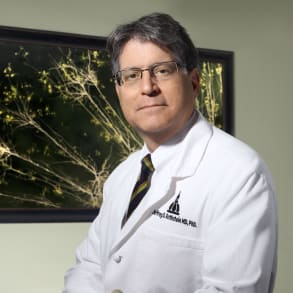Johns Hopkins neurologist Jeffrey Rothstein describes the personalized medicine initiative, Answer ALS, which gathered data points — both clinical and biological in nature — from over 1,000 patients with amyotrophic lateral sclerosis (ALS) who were followed in eight clinics across the United States. The data is available for free to researchers and commercial entities that are trying to better understand ALS and develop new treatments.
Yeah. Hello everyone. My name is Jeff rothstein. I'm a professor of neurology and neuroscience at jOHNS Hopkins school of medicine. I run the A. L. S. Research program in the clinic. LS is a sporadic, largely a sporadic disease affecting middle aged individuals and it's a uniformly progressive and fatal disease. For years we as a community have tried to develop new drugs for this disease and to be honest we do not have strongly effective drugs. In part this reflects the fact that we guess on what could be wrong in a less by looking at perhaps blood markers in mouse models. But we have blacked until recently the ability to truly sample the nervous system of our patients the way we've very successfully done in cancer and many of you know in cancer. We're able to biopsy the cancer, examine its molecular and biochemical properties and so doing come up with pathways that can be even individualized to patients. This has been well established in melanoma and prostate cancer and breast cancer. That biology has now changed so that we can do almost the same thing in A. L. S. Through the use of a newt approach the generation of induced pluripotent cells through sampling of patients blood. We can reprogram that those blood cells into stem cells which are then eventually programmed into the patient's spinal neurons, the very cells that degenerate in A. L. S. And so doing. We have then a biopsy of the patient's nervous system and then we can carry out the very similar kinds of approaches that have been done successfully in cancer including whole genome sequencing proteome ePI genome RNA analysis and to carry this out in in patients. We devised the program answer LS which in which we've enrolled now 1000 patients initially at Hopkins but around the country followed them for well over a year collecting deep clinical data. In fact we've developed even an app for the iphone to collect even more data as this is a progressive disease and often leads to patients failing to come to clinic because of their progressive disability. Their blood was converted into these I. Ps cells. The cells are then converted into neurons and the biological analysis I've mentioned is carried out In total. This amounts to more than six billion data points per patient. It's a lot of data and the cells are a living example of patients and together all of the data and the cells are now freely available through our Answer A. L. S. Web portal which is available to all researchers both academic and commercial. And the point of the program is really as a foundation program so that this data and the cells could be used to discover pathways in A. L. S. And because we have living cells to use them as a platform to discover new drugs because answer LS shares overlap with pathways that are seen in Alzheimer's and other dementias. This data will be equally useful for those researchers, both commercial and academic that are interested in trying to uncover new therapies for not just LS, but other neurodegenerative diseases. Thank you. Mm hmm. Okay. Yeah.



